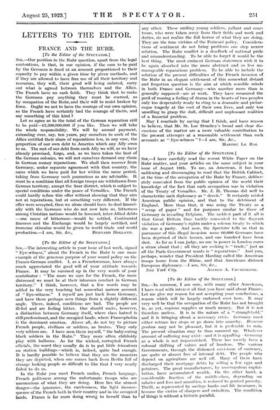[To the Editor of the SPECTATOR.] Sin,—The interesting article in
your issue of last week, signed "Eye-witness," about the French in the Ruhr is one more example of the generous purpose of your sound policy on the Franco-German conflict. I, as a Frenchwoman, have always much appreciated the good will of your attitude towards France. It may be summed up in the very words of your contributor : "The more we care for the French, the more distressed we must be at their inhuman conduct in German territory." I think, however, that a few words may be added to the very touching but somewhat narrow account of "Eye-witness." I myself am just back from Germany, and have there perhaps seen things from a slightly different angle. There, indeed, conditions are bad. The people are ill-fed and are feeling bitter. One should make, however, a distinction between Germany itself, where class hatred is still predominant, and the occupied lands, where Francophobia is the dominant emotion. Above all, do not try to picture French people, civilians or soldiers, as brutes. They only very seldom are. I have seen them myself, "the baby-eating black soldiers in the Ruhr." They more often childishly play with balloons. As for the wicked, corrupted French officials, the worst they usually do is to put little tricouleurs on station buildings—which is, indeed, quite bad enough. It is hardly possible to believe that they arc the monsters they are depicted, when one comes back from Berlin full of strange looking people so difficult to like that I very nearly failed to do so.
In the Ruhr you meet French smiles, French language, French politeness among the unfortunate troops who arc unconscious of what they are doing. Here lies the utmost danger—the ignorance, the carelessness, the light inconse- quence of the French both in their country and in the occupied /ands. France LS far more doing wrong to herself than to any other. These smiling young soldiers, gallant and emir. teous, who were taken away from their fields and work and duties, do not realize the full horror of what they are doing. They are the true victims of the Poineare policy. Considera- tions of sentiment do not bring problems one step nearer solution. The Ruhr conflict is a deadlock of national pride and misunderstanding. To be able to forget it would be the best thing. The most eminent German statesmen wish it to be again absorbed into the more abstract and so less un- manageable reparations problem. To be able to include the solution of the present difficulties of the French invasion of the Ruhr in an elegant settlement of this somewhat distant and forgotten question is the aim at which sensible minds in both France and Germany—who number more than is generally supposed—arc at work. They have measured the peril of rousing a feeling of drama in the hearts of two peoples only too desperately ready to cling to a dramatic and pictur- esque tragedy at the cost of their own lives, and only too unwilling to grasp the dull, difficult and unpleasant realities of a financial problem.
May I conclude by saying that I think, and have reason to believe, that Mr. St. Loe Strachey's broad and clear dis- cussions of the matter are a more valuable contribution to the present attempts at a reasonable settlement than such accounts as "Eye-witness " am, Sir, &e.,
MARTHE LE BAS.


































 Previous page
Previous page